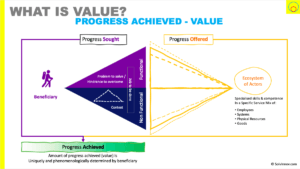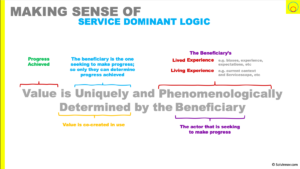At the heart of understanding innovation, being innovative, and where to innovate is understanding what we mean by value.
We know from service-dominant logic that value is co-created. As opposed to being embedded by a manufacturing chain. And value can be co-destructed – which is something we don’t often appreciate.
But what do we mean by value? It’s no longer sufficient to look at it as how much someone is prepared to pay. Rather, we need to think of it in terms of progress that a beneficiary is looking to make. This leads us to say there is something called progress sought. And this progress can be non-functional (safely, quickly, affordably,…) as well as functional (job to be done, hindrance to overcome, problem to solve)
There is then realised value. This is the progress that the beneficiary believes they have achieved when they integrate with a service (and remember, a service can also be self service with goods). That realised value is determined uniquely by the beneficiary and is also dependent upon their lived and living experience (“phenomenologically determined” to use the right phases).
We also know the world is based on service exchange, although indirect trade may mask this. And this indirect trade is often supported by service tokens (cash). Amount paid is not a direct measure of value. Rather, it is a measure of “how much service do I have to give (or have given) to get this service”. We use that in our determintion to hire a service, and to keep going with it for duration.





